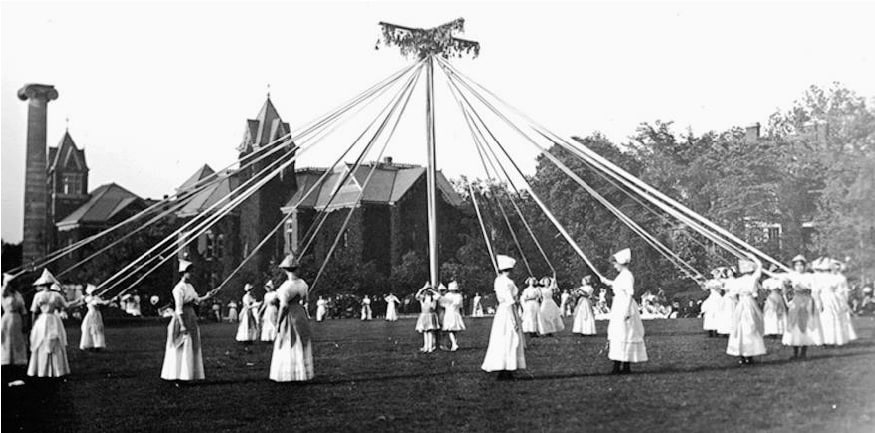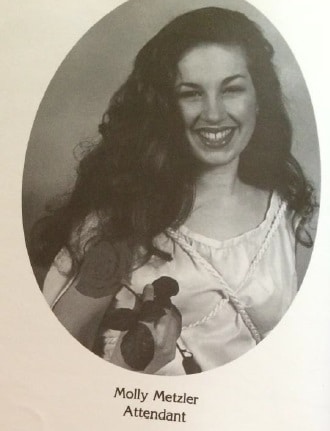The May Queen was commissioned by Chautauqua Theatre Company and premiered there in the summer of 2014. The following is the transcript of an interview between the playwright Molly Smith Metzler and Jenni Werner, Geva Theatre Center’s Literary Director and Resident Dramaturg.

JW: Talk a little about The May Queen and your process.
MSM: I started working on The May Queen when I was pregnant – it was a commission for Chautauqua Theatre, a company I’ve had a lot of history with. They first invited me out in 2010 to do a workshop of my play Close Up Space, then they had me back the very next year to do a workshop of my play Carve, and then they offered me this wonderful commission. The commission was also a residency, so I wrote a great deal of the play while I was in residence at Chautauqua which is a little like getting to write a play at a spa! It’s beautiful and amazing. My whole family came and just played by the lake and I wrote a play. So I wrote about half of the play before Cora, then I had my daughter and I did not even think about opening my computer for six months. But then when I did open it, I really was excited to get back to the play, and it took another six months to have a draft. And Chautauqua committed to it after the first draft, which was wonderful because then my family got to go back to Chautauqua the next summer! We did the math of it and the last five years, I’ve spent four summers in Chautauqua. And next summer I’ll be in Cape Cod, so this is shaping up very well! Being a playwright means very good summers at my house.
Some plays come out really hard, and it’s like pulling teeth. But The May Queen is not one of those plays. It’s set in my hometown. I have a real fondness for these characters. They’re all – none of them are real people – but the emotional connection I have with them is based on real people. And I really wanted to write this play for a long time, so it came out easily.
JW: So this is the first time you’ve written about Kingston, right?
MSM: Yes.
JW: What made this be the right time to write about Kingston?
MSM: You know, I think I’m old enough that I have a little perspective about – basically how special it is to have a hometown. You know, I don’t think you appreciate that when you’re in your twenties. Frankly, I didn’t appreciate it until I had Cora, when I was 35, and it was that sense that when you go home, your neighbors know you. And you go to the mall and run into people you know. And that kind of basically it’s just special to have a hometown. Kingston has a lot of character. My mom grew up in Kingston. So my mom knows everyone in town. One thing I think is funny about my mom is that she knows who all the May Queens were, for like the last 50 years. But it’s a really warm place and as I’ve gotten older, I’ve grown to appreciate that. Just that going home can be really special.
JW: So there’s a character in The May Queen who goes home, but it’s not so special for her. Talk a little bit about what is it for Jen Nash, when she goes home, and she hasn’t been successful – or she was successful and then lost everything, and has come home. Talk about that a little, where that character comes from.
MSM: Mostly, I’ve always thought it’s really interesting – the May Queen is a real thing in Kingston, NY. There’s a real crowning of the May Queen in Kingston, so it still happens –
JW: What does that mean?
 MSM: OK, so the May Queen is on the first day of May and there’s a Maypole dance, and it goes back to Greek times. There’s the crowning of the vestal virgin and sacrifice, which I don’t get into all of that in the play. But usually it’s just the prettiest popular girl and you put her in a toga and you put a flower thing on her head and there’s a maypole dance. But at Kingston High School it was a huge deal. The entire high school votes for the May Queen, not just the seniors. It’s the whole school. There’s a parade, the band plays and everyone performs, and the stadium is packed. Everyone comes, it’s a very big deal. And if you’re the May Queen, it’s a huge honor, but you’re also kind of pegged with this title. It comes with a lot of Kingston legacy.
MSM: OK, so the May Queen is on the first day of May and there’s a Maypole dance, and it goes back to Greek times. There’s the crowning of the vestal virgin and sacrifice, which I don’t get into all of that in the play. But usually it’s just the prettiest popular girl and you put her in a toga and you put a flower thing on her head and there’s a maypole dance. But at Kingston High School it was a huge deal. The entire high school votes for the May Queen, not just the seniors. It’s the whole school. There’s a parade, the band plays and everyone performs, and the stadium is packed. Everyone comes, it’s a very big deal. And if you’re the May Queen, it’s a huge honor, but you’re also kind of pegged with this title. It comes with a lot of Kingston legacy.
My mom probably can’t tell you who was President when she graduated from high school, but she can tell you who the May Queen was.
It’s that chosen girl. And I think it’s a blessing and a curse. But I wanted to explore, in this play, what it’s like to be the one, the chosen one. The one we’re all kind of watching to see what happens, and how there’s more pressure on that person, and how maybe going home for her is way more complicated than it is for me to go home.
JW: You weren’t the May Queen?
 MSM: Here’s the thing – I was not the May Queen, I was on the May Court. So I have incredible inside knowledge…But no, there’s a May Queen and there’s a court of 6 girls, and they put them all in ridiculous togas and parade them in. And I was kind of eye-roll-y about the whole thing. I think, like any school, too, there’s the nerd, and the cool kid on the court and the jock on the court. And I was the nerd vote. And the most beautiful popular girl was the May Queen, and per always. And it’s that funny thing where you’re like, “Oh, what happened to Jessie? What exciting man did she marry? Or what exciting woman did she marry? Or what great country is she living in? What language did she learn? How big was her diamond?” And when you find out that they’ve actually struggled more than you have, it’s interesting. It’s a target on your head.
MSM: Here’s the thing – I was not the May Queen, I was on the May Court. So I have incredible inside knowledge…But no, there’s a May Queen and there’s a court of 6 girls, and they put them all in ridiculous togas and parade them in. And I was kind of eye-roll-y about the whole thing. I think, like any school, too, there’s the nerd, and the cool kid on the court and the jock on the court. And I was the nerd vote. And the most beautiful popular girl was the May Queen, and per always. And it’s that funny thing where you’re like, “Oh, what happened to Jessie? What exciting man did she marry? Or what exciting woman did she marry? Or what great country is she living in? What language did she learn? How big was her diamond?” And when you find out that they’ve actually struggled more than you have, it’s interesting. It’s a target on your head.
JW: When you write about something that is so personal – growing up, going home – do you find that you have to balance how much you pull from people that you know? You’ve said that the spirit of these characters you’re close to, so do you feel like there’s a balance between fact and fiction? How do you tread that?
MSM: Well, I think that you get better at that balance the more plays you write. You know? Like my first play, there’s no balance. It’s just all real, slightly dramatized facts. And that’s good, that’s what your first few plays should be. And then when you get a little bit more experienced then you can cleverly disguise people and you can write about things that you don’t know about because you can latch into the character. There has to be something in the character that I can latch onto to make it real. So while I can’t relate to a lot of Jen’s life, there’s that one thing that she and I have in common that I can latch onto. I feel like this play is pretty balanced in terms of fiction and fact, but you do get better at it –
JW: As you write more –
MSM: Yeah, because you feel stronger. It’s a muscle, and you feel like, “Oh, I can flex that muscle.” It’s very safe to write exactly what you know. So as you get a little bit more experienced, you feel like, “Oh, I can write about an addict because I understand – I’ve quit smoking. I know what it’s like to be – you have to find some way to be relatable. But you have to find some way to free yourself from writing only what you know because – they’re done. I wrote those things.
JW: So there is that saying “Write what you know.” That’s clear advice that’s been given to writers forever. Do you think it’s possible to write outside of your own experience totally?
MSM: The play I’m working on right now, I’m writing a character who’s totally outside of my experience. I have nothing in common with my character Adrienne. And I think, because of that, I love writing her more than usual. Because I’m searching for the empathy in her as I’m working on her. I’m searching for something to turn me around on that. But I believe in that “write what you know.” I think that’s really good advice, especially to younger writers, but I would revise the statement to “write what you know emotionally.” Because that’s the harder part, actually, the emotional life of the characters. So you don’t have to write a play set in Kingston, NY, but if you can write one emotionally set in Kingston, NY, that will help. So, I did both – emotionally and literally, but…
JW: So, the play is set in an office, an insurance company.
MSM: I know nothing about that.
JW: Why did you pick an insurance company?
MSM: Because I think it sounds banal but also totally relatable. And I feel like this little company – there’s one in Utica, there’s one in Rensselaer, there’s one in every suburb of New York. It could be anywhere. And that’s sort of – if it was a small newspaper, that sort of says something. Because newspapers are on their way out or you know – insurance is just boring, it’s here to stay –
JW: We’re always going to need insurance.

MSM: We’re always going to need it and I feel like very few people in this kind of entry level world of insurance are living their dreams. I don’t think there’s many of us that say in kindergarten, “I want to be in entry level insurance.” So there’s something kind of stagnant about it, and also a little lonely. I wanted an office that felt really lonely.
JW: Now, the play also has a young, up and coming manager, Nicole. Is insurance her gig? Is that her thing?
MSM: I don’t think so. I think power is her gig. I have a lot of sympathy for Nicole because I think she has worked extremely hard in college, got really good grades and got her associate’s degree in management, got really good grades. I think she’s played by the book. I don’t think she’s ever broken any rules or lived that life. She’s an adult child, for sure. And she sort of thinks that she’s making choices that should make her happy, and in fact they’re horrible and miserable. And I sort of feel like, if any of these characters are going to have a total break down after this play, go cross country, eat ramen and have an orgy, and just figure out who they are, it’s Nicole. I think Nicole’s the most lost of all the characters. I think that’s relatable too. You know, we send these kids to college now and they come out and there aren’t jobs that someone like Nicole, with her sterling academic records, could only get a crappy mid-management job at a horrible insurance company.
JW: One of the things I love about your plays is that they begin light and funny, and you think that it’s purely comedic. You’re just going to laugh. And then they become – you’re still laughing – but they open up into something deeper, something more than just comedy. You know, comedy has its place, absolutely, but I think your plays become bigger than that. How do you know when to make that shift? Is that something you’re conscious of? Or is that something that just happens naturally as you’re telling the story?
MSM: Well, all playwrights are really different about this, so I don’t know. But I find when I’m getting to know characters, I kind of let them lead me. And usually, like in life, things that are funny aren’t funny for long. Even the most hilarious comedian usually comes from a kind of dark background. I tend to really gravitate to characters that have a lot of dimension because I think that’s just sort of true. The funniest people I know are also the most f***ed up. And I tend to write about a lot of f***ed up people so there’s a lot of comedy. But I also think that comedy is relaxing. You know, usually, if you sit down in a Shaw play, and you’re like, “This is going to be a searing drama, and I’m going to go on a two hour journey, and it’s a drama,” you have to be in a different mind frame. But if you’re sort of glided into a drama, I just think it’s a gentler ride. And comedy makes people listen a little more carefully.
I think comedy makes people like characters more. It makes them on their side more quickly. And I feel like that’s a natural way to get into a story that’s going to have a little bit of depth.
I like to be a gentle storyteller. I think that’s why I gravitate towards comedy. Light and darkness.
JW: Is there anything that you would want people to think about before they come to see the show?
MSM: Well, I think that one of the topics that the play kind of dances around but it doesn’t settle on is the recession, and there’s been layoffs in the office. Kingston is depressed. I think there’s sort of – the way office culture is changing is sort of in there a little bit.
JW: Office culture is changing. You know, certainly in Rochester, we see that. Companies downsizing or outsourcing –

MSM: And it’s the older characters who are getting laid off. And that’s sort of why, when Mike usurps his power at the end of the play, that’s why it was important to me that he invited Uncle Carl back, because there’s an awareness that what’s happening isn’t really fair, but it’s hard to do anything about it. Because people like Nicole are taking over, because they’re cheaper, and they shouldn’t be. So I think there’s that thread in there a little bit.
But also, one of the things that I’m going to be doing a re-write of the play before the show, and one of the things I’m thinking about is just memory. I think what actually got me thinking about the play in the first place, the very beginning, the kernel of it – was that I had an interaction with someone I went to high school with, and he was apologizing to me for this event that I have absolutely no memory of at all. And it was this big deal for him, because he’d gotten out of rehab, actually, and been like, this has been bothering me for 18 years, and I want to apologize. But in his memory, he tried to force me to kiss him at a basketball game, and I got mad and pushed him away and never spoke to him again. And I have no memory of this at all. So not only did I push him away and he was traumatized about it, but it meant so little to me that I don’t remember it. And this person has tortured himself about it, so that’s what kind of inspired the play in the first place. Because I think high school is an incredibly impressionable, vulnerable time, in so many ways, we’re shaping who we are as adults. And we can have an incredible impact on each other and not know, and the idea of memory and how they can change and twist. How we shape our own narrative about who we are, and how other people shape our narratives. All those things, particularly in high school, I found really interesting. And in so many ways, you can’t escape who you were in high school, even if you want to. Jessie Stash will never escape being our May Queen. She could get the Nobel Prize for Neuroscience, and we will still mostly talk about the fact that she was May Queen.
The May Queen opens November 22. Click here for tickets or call 919.962.7529 for more information.